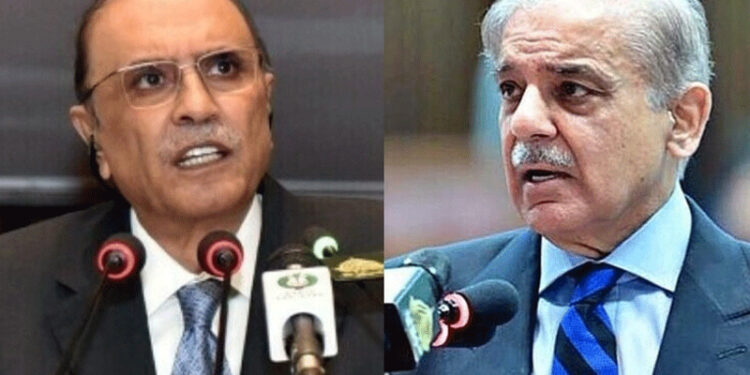Introduction: Celebrating International Parliament Day in Pakistan
Islamabad, As countries around the world observe International Day of Parliamentarism, Pakistan’s top leadership—President Asif Ali Zardari and Prime Minister Shehbaz Sharif—have issued special messages emphasizing the pivotal role of Parliament in strengthening democracy, ensuring good governance, and protecting the rights of citizens.
The Prime Minister underscored that Parliament is not merely a legislative body but the heart of democratic governance, playing a central role in ensuring accountability, inclusiveness, and national unity. The President echoed these sentiments, stressing the importance of Parliament as the sovereign representative of the people and a custodian of constitutional values.
This annual observance, established by the Inter-Parliamentary Union (IPU), aims to raise awareness about the vital role parliaments play in shaping societies, upholding democracy, and addressing the challenges facing modern governance.
The Prime Minister’s Message: Strengthening Democratic Foundations
In his message, Prime Minister Shehbaz Sharif highlighted the importance of Pakistan’s Parliament in promoting inclusive governance and ensuring the rule of law. He remarked that Parliament remains at the core of Pakistan’s democratic system and is essential in:
- Holding the executive accountable
- Ensuring policy transparency
- Facilitating legislative oversight
“Our Parliament holds a central place in our democratic system. It ensures accountability and oversight of the executive through its legislative powers,” said the Prime Minister.
He also drew attention to Parliament’s contributions in advancing gender equality, social protection, and inclusive growth, noting that legislators have taken progressive steps to uplift marginalized communities, especially women, through landmark bills and reforms.
Furthermore, he appreciated the active role of Pakistani parliamentarians in international diplomacy and conflict resolution, especially in the wake of regional tensions in South Asia.
“Our Parliament worked for the promotion of peace, development and international cooperation. After the recent tensions in South Asia, the parliamentary delegation presented our point of view at global forums,” Sharif said.
Pakistan’s Global Parliamentary Diplomacy
Prime Minister Shehbaz Sharif particularly acknowledged the role of Pakistan’s Parliament in engaging with global institutions and forums, including the United Nations, IPU, and regional parliamentary associations, to advance the country’s narrative on international challenges such as climate change, regional peace, and Islamophobia.
In recent years, Pakistani parliamentary delegations have taken strong stances on:
- Human rights violations in Kashmir
- Islamophobia in the West
- Global climate injustice affecting developing countries
By advocating for these issues at international platforms, Pakistan’s lawmakers have played a significant role in shaping global discourse and protecting national interests.
A Call to Strengthen Institutions and Democratic Values
Marking the significance of the day, Prime Minister Sharif also called for a renewed national commitment to safeguarding democracy and strengthening institutions. He emphasized the need for continued efforts to ensure that Parliament remains a true reflection of the people’s voice.
“On this day, let us resolve to strengthen parliamentary institutions and protect democratic values. We must ensure the true reflection of the voice of citizens in legislation,” he added.
The Prime Minister urged all stakeholders—government, opposition, civil society, and media—to work collectively to preserve the integrity and independence of parliamentary processes.
The President’s Message: Parliament as the Guardian of Constitutional Values
President Asif Ali Zardari, in his message, described Parliament as the foundation of democratic governance, highlighting its function as the sovereign representative of the people.
“Parliament is the guardian of constitutional values. We will remain committed to the principles of democracy, freedom, inclusion, tolerance, and social justice,” said President Zardari.
He stressed that Parliament plays a central role in:
- Formulating national policy
- Promoting economic and social justice
- Safeguarding the fundamental rights of citizens
The President appreciated the efforts of Parliament in facilitating inclusive, participatory governance and promoting transparency and accountability through legislation and oversight mechanisms.
“It is the responsibility of legislative institutions to protect democratic values. Parliament will continue to exercise effective oversight to ensure public accountability,” Zardari stated.
Legislative Achievements and Progress
In recent years, Pakistan’s Parliament has passed several key pieces of legislation aimed at social justice, economic development, and institutional reform. Some notable initiatives include:
- Protection Against Harassment of Women at Workplace (Amendment) Act
- Right to Free and Compulsory Education Act
- National Commission on the Rights of Child Act
- Whistleblower Protection and Vigilance Commission Bill
These legislative efforts have not only addressed critical issues within Pakistani society but have also earned praise from international human rights organizations.
The Role of Parliament in Crisis Management and National Unity
Both the Prime Minister and President praised Parliament’s role in unifying the nation during times of crisis, including:
- The COVID-19 pandemic, where emergency measures and relief packages were legislated
- Economic instability, with Parliament facilitating budgetary reforms and international cooperation
- Security challenges, where lawmakers worked together across party lines to support national defense and anti-terror strategies
Parliament has also been instrumental in advancing climate legislation, including the Pakistan Climate Change Act, positioning the country as a responsible stakeholder in the fight against global warming.
Inter-Parliamentary Union and International Parliament Day
The International Day of Parliamentarism was established in 2018 by the United Nations, in collaboration with the Inter-Parliamentary Union (IPU). Celebrated every year on June 30, the day marks the anniversary of the IPU’s founding in 1889, which is the oldest global organization of parliaments.
This day is celebrated to:
- Promote the role of parliaments in democracy
- Strengthen legislative institutions worldwide
- Encourage dialogue and cooperation among national parliaments
Pakistan has been an active member of the IPU, participating in its conferences and playing a role in various initiatives, including digitalization of parliamentary processes, gender inclusivity, and youth representation.
Public Engagement and Democratic Evolution
A key theme of this year’s International Parliament Day is public engagement. Pakistani leaders emphasized that citizen participation is vital for a thriving democracy.
In this context, both President Zardari and Prime Minister Shehbaz Sharif have called for:
- Improved access to parliamentary proceedings through digital platforms
- Enhanced civic education to increase public understanding of legislative functions
- Encouraging youth and women to participate in democratic processes
Efforts such as live streaming of parliamentary sessions, digitization of archives, and open data initiatives are already underway to improve transparency and public involvement.
Conclusion: A Renewed Commitment to Democratic Values
As Pakistan commemorates International Parliament Day, its leaders have reaffirmed their dedication to strengthening parliamentary institutions, promoting democratic values, and ensuring inclusive governance.
The Prime Minister and President’s statements reflect a shared vision of a more participatory, accountable, and resilient parliamentary system—one that can tackle the complex challenges of the 21st century while remaining deeply connected to the people it serves.
The call to action is clear: strengthen institutions, promote justice, and let the voice of the people guide the nation’s legislative future.

























